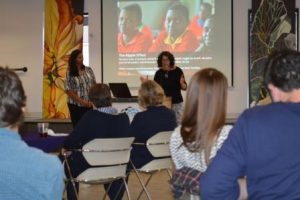AfricAid Steps In to Fill Educational Gaps for Tanzanian Girls

“When governments fall short, NGOs fill the gaps,” said Maria Rosa Galter, Executive Director for AfricAid. Galter outlined many reasons why AfricAid exists today. One of those reasons is the sponsorship of disadvantaged girls, to provide young women in Tanzania with an education.
It’s true — there are plenty of gaps to be filled in Tanzania.
Education in Tanzania
Tanzania, an East African country of about 50 million people, has accomplished a lot for its people, yet has fallen short in other areas, including the provision of education for its own citizens.
“When we give a girl an education, we are investing in a whole generation that will come after her,” Rosa- Galter told the audience at Posner. “It is truly amazing to see these girls, the effect that this program is having. We are really changing the way these girls see themselves.”
Citing World Bank sources, the African Economist states that despite the introduction of free primary education in Tanzania in 2001, the country still lags behind other African countries in proving basic access to education for its citizens.
“For one, Tanzania still has one of the lowest primary-to-secondary transition rates in sub-Saharan Africa (at just 41 percent in 2009), with girls being particularly disadvantaged. In addition, standardized assessments have revealed that the quality of education is insufficient to provide students with the most basic numeracy and literacy skills. According to the World Bank, Tanzania scored much lower than Kenya or Uganda in these assessments in 2011,” the report states.
While Tanzania is experiencing economic growth, the World Bank tells us the opportunity to provide broad-based development could be missed if action is not taken.
For AfricAid, the focus is on the sponsorship of girls to get an education and the ability for them to lead better lives. Galter says the organization is revolutionizing girls’ education in Tanzania by using a so-called Kisa Project, a leadership immersion and mentoring program, to create the next generation of leaders in Africa. Because of this, she says, hundreds of young girls have been able to attend school and are now professionals in many sectors of the Tanzanian economy.
Why Girls?
The organization contends that “Young African girls all too often can’t afford to complete their education, and parents generally send sons to school instead of daughters when forced to choose. Indeed, 95 percent of girls in Tanzania are unable to complete secondary school.”
“At the same time, girls aren’t taught to believe they can achieve what men can, and rarely have mentors or role models to show them otherwise. Yet, these are very often the same bright young women who would eventually work to address their communities’ most pressing needs if they had the proper tools to do so,” the program site says.
Economically speaking, this approach has a “multiplier effect” according to Kinsey, who is shepherding the project in Tanzania. The organization states many young women have been able to break the cycle of poverty and their communities have been made better as a result.
During the event, the organization announced that a group of Rotarians from Colorado will soon undertake a seven-day challenge called the KiliClimb. They will attempt to climb Mount Kilimanjaro in January 2016, as a way to encourage girls’ education in Tanzania.
“The idea is that some of our scholars will climb the mountain with us,” said Rosa-Galter. “Four of our Kisa Graduates and two of our mentors will be climbing with the group.”
The organization was founded in 2001 by Denverite, Ashley Shuyler, who saw the need for girls’ education after a trip to Tanzania in 1996.
Read more, courtesy of AllAfrica.com: Tanzania: Local Schoolgirls’ Capabilities Untapped for Lack of Confidence

